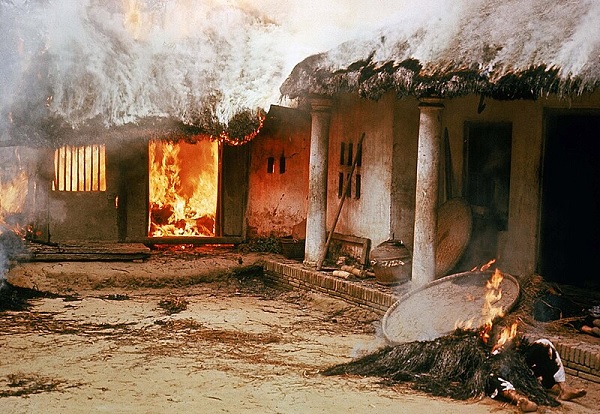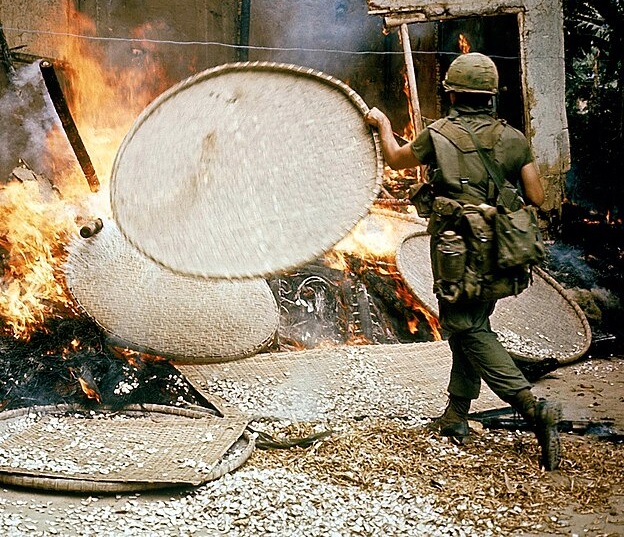By Cindy Sheehan
Mar 16, 2024
The Killing Fields
The My Lai Massacre: A Painful Anniversary and Demand for Peace
The My Lai massacre, one of the most harrowing chapters in the fraught history of the Vietnam War, continues to serve as an indelible reminder of the savagery and depravity war can yield. This year marks the 56th anniversary of the atrocity, an appropriate juncture for reflection on the horrors of conflict and a catalyst for a discussion around the abolition of war itself.
The Horrors of War Laid Bare
On March 16, 1968, American soldiers descended upon the My Lai village, convinced it harbored Viet Cong and their sympathizers. What ensued was a grotesque orgy of violence, rape, murder, torture, and destruction, against unarmed men, women, and children. The figures are numbing: between 347 and 504 civilians were systematically killed, their lives extinguished in a wave of brutality that defied any semblance of human decency.
The Crimes of Lt. Calley
At the heart of My Lai’s horror stands the figure of Lieutenant William Calley Jr., the commanding officer of the unit responsible for the massacre. Calley, who directly participated in the killings, was found guilty of murder and sentenced to life imprisonment (which he did not serve). His actions, and those of his men, etch another dark stain in the annals of warfare.
Interestingly enough, this is one of the statements Calley made on the witness stand during his court-martial:
Well, I was ordered to go in there and destroy the enemy. That was my job on that day. That was the mission I was given. I did not sit down and think in terms of men, women, and children. They were all classified the same, and that was the classification that we dealt with, just as enemy soldiers…I felt then and I still do that I acted as I was directed, and I carried out the orders that I was given, and I do not feel wrong in doing so, sir. “United States v. Calley, U.S. Court of Military Appeals (1973), 22 USCMA 534, 48 CMR 19”. Retrieved March 16, 2021
We all know that civilians are targeted and not protected by Imperial forces—in Iraq, troops were taught to call Iraqi “sand n!ggers” or “Hajis.” If humans are dehumanized, it is easier to treat them like they mean nothing, which makes it easier to commit atrocities against them.
Was Calley the only troop that obeyed these awful orders in a horribly tragic military abomination? Of course not. Here is what Robert Jay Lifton says about war:
Yes, atrocities occur in all wars, but in a certain kind of war they can become almost inseparable from everyday combat. By atrocity-producing situation I mean an environment so structured, militarily and psychologically, that an average person entering it, no better or worse than you or me, could be capable of committing atrocities. The military structure includes a counterinsurgency war in a distant, alien environment, against a nonwhite adversary, where it becomes extremely difficult to differentiate combatants from civilians. Add to that the uneasy psychological responses of occupiers or invaders, combinations of fear, helplessness, angry grief in response to the death of buddies, and hunger for an enemy who will “stand up and fight.” The American Way of War by Robert Jay Lifton
To be fair, Calley said this in a speech in 2009:
There is not a day that goes by that I do not feel remorse for what happened that day in My Lai. I feel remorse for the Vietnamese who were killed, for their families, for the American soldiers involved and their families. I am very sorry.
I have a feeling he is very haunted by the ghosts of My Lai, and, even though his actions were disgusting, deplorable and inexcusable, he was offered up at the sacrificial scapegoat for the millions of war crimes committed during the “American War.”
The Heroism of Hugh Thompson
(April 15, 1943 – January 6, 2006)
Yet, from this hellscape, a beacon of humanity arose. Warrant Officer Hugh Thompson, an Army helicopter pilot, witnessed the bloodbath from above and took it upon himself to intervene. Realizing the extent of the massacre, Thompson landed his aircraft and actively protected and evacuated the survivors. His courage in the face of fellow soldiers who had disregarded their most primal instincts and the military ethos of ‘leave no one behind’ is a testament to the possibility of goodness amidst unbridled evil.
In 1998, 30 years after the massacre, Thompson and the two other members of his crew, Andreotta and Colburn, were awarded the Soldier’s Medal (Andreotta posthumously), the United States Army’s highest award for bravery not involving direct contact with the enemy.Thompson and Colburn returned to Sơn Mỹ to meet with survivors of the massacre at the Sơn Mỹ Memorial in 1998. In 1999, Thompson and Colburn received the Peace Abbey Courage of Conscience Award. (I received this award in 2005)
War, a Barbaric Anachronism
The Vietnam War, and My Lai specifically, epitomize the visceral inhumanity that war breeds. In a world increasingly connected and interdependent, the toll of such conflicts is not just measured in lives lost but also in the permanent scars it leaves on the collective psyche of nations and societies. It begs the question, in these modern times, is there a place for war? (Fuck, no!) Is the characterization of war as a ‘necessary evil’ still defensible when confronted with the definitive evidence of its actuality as an anachronistic institution that can no longer fulfill its ancient purpose in the face of modern geopolitical crises?

Abolishing War: An Idealistic Dream or an Achievable Reality?
The idea of abolishing war may seem utopian, idealistic even, in a world where aggression and assertion of power continue to shape international relations. However, the concept has roots that stretch beyond mere rhetoric. The Kellogg-Briand Pact, signed in 1928, renounced the use of war and called for the peaceful resolution of conflicts. This legal document, though its application remains non-existent, reinforces the notion that global peace is a pursuit worthy of our most concerted efforts.
Toward a Culture of Peace
From Ukraine to Yemen to Gaza to My Lai and an almost infinite number of other war atrocities present a compelling argument for a reevaluation of THEIR stance on war. Perhaps it is time WE endeavor to cultivate a culture of peace as ardently as THEY prepare for war. This involves not just the cessation of hostilities but a concerted, multi-pronged approach that includes diplomacy, economic development, and the nurturing of political environments that foster inclusion and representation rather than marginalization and disenfranchisement.
Personal Reflection and Call to Action
As we commemorate the victims of My Lai and countless other war aberrations, it is incumbent upon each of us—pacifists, scholars, veterans, and civilian populations—to espouse a collective ethos of peace. This ethos need not be passive; it can be robust and unyielding in its resolve to avert violence through the pursuit of justice, equality, and understanding.
The 56th anniversary of the My Lai massacre serves as more than a grim marker of history; it is a call to undo the manifold wrongs that resonate with the thunder of howitzer shells long silenced. It is a commemoration of sacrifice that honors not just the fallen, but those who rise above the mandate of violence to cultivate peace. It is an opportunity to contemplate the legacy we wish to craft, one that, with each step, inch by inch, moves humanity away from the precipice of its most vicious instincts, toward a plateau where serenity and comprehension stand as the ultimate goal.
Cindy Lee Sheehan is an American anti-war activist, whose son, U.S. Army Specialist Casey Sheehan, was killed by enemy action during the Iraq War. She attracted national and international media attention in August 2005 for her extended antiwar protest at a makeshift camp outside President George W. Bush’s Texas ranch—a stand that drew both passionate support and criticism. Sheehan ran unsuccessfully for Congress in 2008. She was a vocal critic of President Barack Obama’s foreign policy. Her memoir, Peace Mom: A Mother’s Journey Through Heartache to Activism, was published in 2006. In an interview with The Daily Beast in 2017, Sheehan continued to hold her critical views towards George W. Bush, while also criticizing the militarism of Donald Trump.
Ms.Sheehan was the 2012 vice-presidential nominee of the Peace and Freedom Party, and received 1.2% of the statewide vote in the 2014 California gubernatorial election.
The author graciously has granted this website permission to reprint selected essays and articles.
The views expressed by the author do not necessarily reflect those of APS Radio News or of its affiliate, APS Radio


